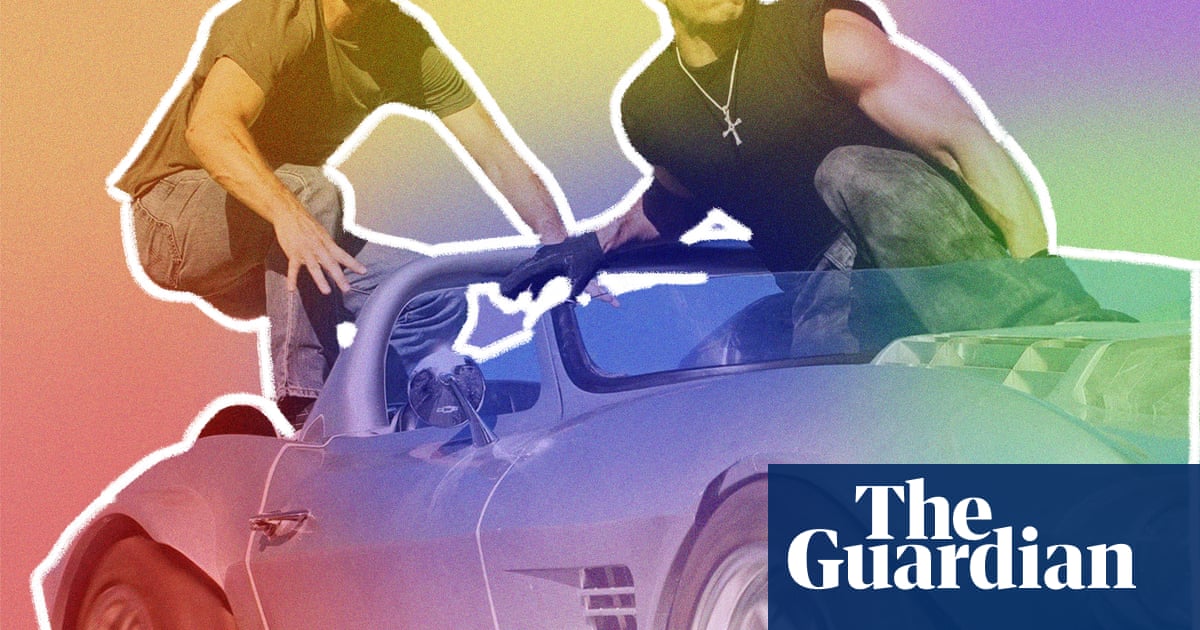I am a 42-year-old lesbian who can’t drive. And, since I’m baring all, I will add that I loathe people who drive extremely fast in obnoxiously large cars. Which, unfortunately, seems to be every third person in the US. In short, I’d wager I’m probably not the target audience for theFast & Furiousfilms.
I’m sure I don’t need to explain the blockbuster franchise to you: the first instalment came out in 2001 and the series has generated billions. But if you are somehow unfamiliar with them, the basic premise is that a ragtag team of misfits and street racers travel around the world, driving cars fast and furiously, beating up baddies.
Target demographic or not, I’m a big fan. Ever since I watched The Fast and the Furious: Tokyo Drift (2006) on a plane I’ve been obsessed with the films. Which, I will concede, are very stupid (my four-year-old could come up with the “plot” for a typical F&F movie). But they are also great fun. And extraordinarily gay.
First, there’s the fact that they are completely over-the-top. As camp as they come; the drag queens of the cinematic world. In F9 they send a Pontiac Fiero to space for God’s sake: the film is so gay it defies gravity. F7, meanwhile, featuresone of my favourite super-camp scenes(don’t judge): Dwayne “the Rock” Johnson is in hospital with his arm in a cast but realises he has to drive fast cars and beat people up so busts open the cast by flexing his huge biceps while announcing, “Daddy has to go to work.” I mean,come on,talk about the performance of gender.
Speaking of performance, there’s also the Rock’s name. There is something just a tinge lavender about a man called Dwayne Douglas deciding to go by “the Rock” instead. And then you’ve got Mark Sinclair, who plays Dominic “Dom” Toretto in the franchise. Mark’s stage name, of course, is Vin Diesel. I would absolutely give myself a name like that if I was going to be a drag king. Vin Diesel, Von Biceps, Tommy Testosterone – something along those lines.
As any fan will know, ultimately Fast & Furious is about family.Dom Toretto says the word “family” about 100 times in each movie and he doesn’t mean his nuclear family. Rather the word refers to his ride or die crew of friends – who happen to be a very diverse bunch. It’s cheesy, yes, but this emphasis on a chosen family is also quietly radical and queer-coded.
I came out more than 20 years ago, when the world was a lot more homophobic than it is now. My family has always been supportive but I know plenty of people who haven’t been so lucky. A2013 Pew studyfound that about 39% of LGBT Americans have been rejected by a family member or close friend because of their sexual orientation or gender identity. Finding your chosen family, and redefining what “family” means, has always been part of queer culture.
I feel particularly conscious of what “family” means at the moment, as my wife and I raise a four-year-old. She is our only child but she has a number of half-siblings through the sperm donor, and we are in contact with these families: we are all woven together now. We spend a lot of time talking to our child about how every family is different, and try to expose her to different types of families. Still, looking at the world through her eyes, I have become hyperaware of how ingrained the idea of the heterosexual nuclear family is in society.According to a 2023 study, only 47% of Americans see a married gay or lesbian couple raising children together as completely acceptable. The idea that a proper family consists of a married mum and dad with two kids (preferably one of each gender), is reinforced in everything from cartoons to commercials.
Fast & Furious would never be described by anyone as “woke”. And yet it has always had diverse talent in front of and behind the scenes – one reason it’s been so popularacross many demographics. In 2015 Vin Dieselnoted that: “It doesn’t matter what nationality you are. As a member of the audience, you realise you can be a member of that ‘family’.” This is the beauty of F&F: it doesn’t try to hit you over the head with political messaging, but it does constantly reinforce the idea that love is love.
